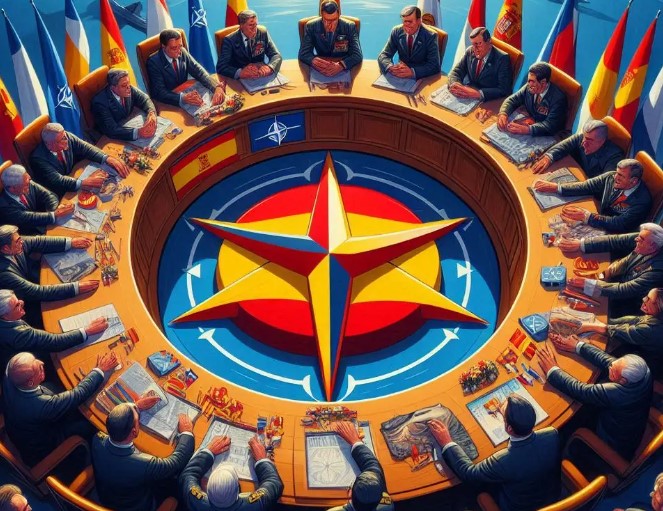Pedro Sánchez’ controversial agreement on defense spending is causing tensions within NATO, raising questions about the future unity of the military alliance.
The recent agreement between Spanish Prime Minister Pedro Sánchez and NATO Secretary General Mark Rutte, which grants Spain a flexible approach to its defense spending, is generating significant discussion and concern within NATO. While Sánchez emphasizes that his country will not have to meet the targeted 5% of GDP for military investments, diplomatic sources see this agreement as a potential threat to the alliance’s unity.
A Precedent for Other NATO Members?
“This agreement is unfair to other countries,” according to diplomatic sources, who fear that this special treatment could open the door for similar demands from other nations. Countries such as Belgium, Italy, Canada, or Slovenia, which have previously shown reluctance to accept NATO’s proposed 3.5+1.5 model, might now also request special arrangements. Critics emphasize that the manner in which this agreement is presented is also heavily politically motivated, aimed at strengthening Sánchez’s domestic position.
The North Atlantic Treaty Organization itself continues to adhere to the goal of 5% of GDP for defense spending. It argues that Spain must raise its expenditures to this level to meet all required capabilities. The Spanish government, however, insists that 2.1% will suffice. Furthermore, the executive managed to have the spending targets reviewed again in 2029, and the deadline for developing all capabilities was extended to 2035, instead of the originally proposed year 2032 by Rutte.
The Summit of Decisions: Ratification Pending
The agreement must now be ratified at the upcoming NATO Summit. Diplomatic circles emphasize that the pact has so far only been concluded between the President of the Spanish Government and the NATO Secretary General – and not with all alliance members. The opinions of figures such as German Chancellor Friedrich Merz, the Baltic and Nordic countries, and US President Donald Trump, who already stated last week that 5% is non-negotiable for all alliance members, are eagerly awaited. Trump clearly stated on Friday: “Spain has always been a country that has always paid very little. Either they were good negotiators or they just didn’t do the right thing. Spain must pay the same as everyone else.”
Sánchez’s Negotiation Skills and Internal Challenges
The current situation is the result of a negotiation process that was initially uncertain for the Spanish government. Sánchez’s refusal to spend 5% of GDP on defense led to speculation about the next steps. Ultimately, Rutte opted for negotiations, which was interpreted as an important signal to La Moncloa. Sánchez himself was actively involved in talks with various heads of state and government throughout the weekend, while his chief of staff, Diego Rubio, maintained contact with the NATO Secretary General’s office.
The agreement was formalized by Rutte’s letter to Sánchez yesterday. It states that NATO will “give Spain the flexibility to determine its own sovereign course to achieve its capability goals and the annual resources required as a percentage of GDP and submit its own annual plans.” Sánchez’s target is 2.1% of GDP, as this is considered sufficient by military technical experts to meet the capabilities required by the alliance. In La Moncloa, the 5% mark was considered “arbitrary” and “not sufficiently justified.”
The Spanish government emphasized over the weekend that it had no intention of “blocking” the NATO summit but would remain steadfast in its refusal to reach 5% of GDP in military spending. In a phase of internal weakness, characterized by an alleged corruption conspiracy uncovered within the PSOE and the government, the head of the executive used this confrontation to divert attention from the crisis and avoid further alienating his coalition partners.
This pressure and the need to maintain Sánchez’s credibility prompted the government to mobilize its entire diplomatic machinery. When an investment plan for security and defense of 10.471 million euros was announced, Sánchez promised that this would be done without touching “a single cent of social spending.” Having to spend 80 billion euros annually would have meant, as he admitted, “breaking our word,” in addition to cutting social aid and raising taxes.




